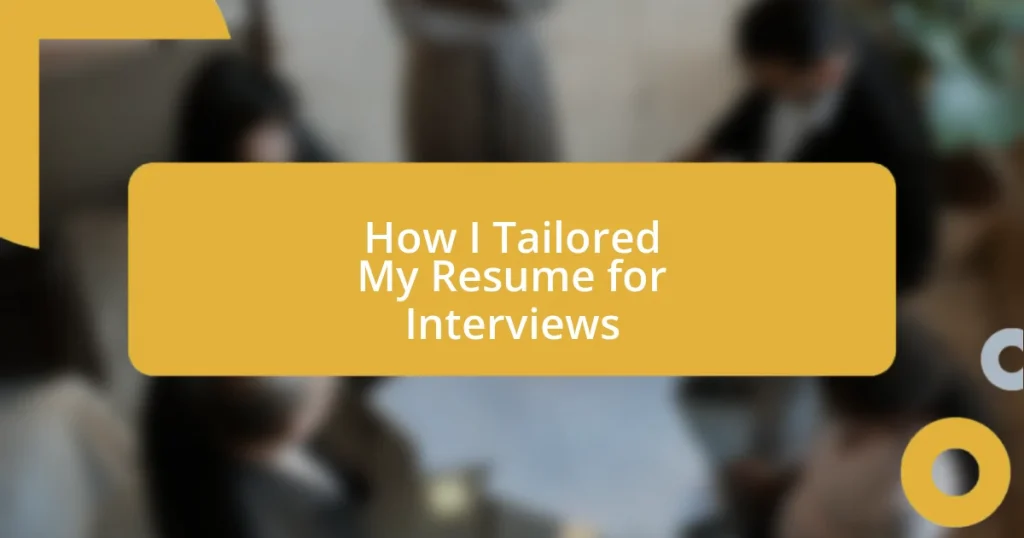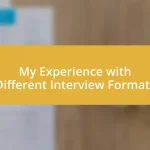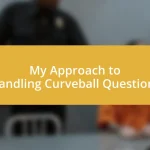Key takeaways:
- Understanding the job description and company values is crucial for tailoring your resume effectively.
- Highlighting relevant experiences with concrete examples and quantifying achievements enhances your resume’s impact.
- Optimizing for keywords relevant to the job description is essential for passing through Applicant Tracking Systems (ATS).

Understanding the job description
Understanding the job description is a pivotal first step in tailoring your resume. I still remember when I first stumbled into a job that seemed perfect on paper, but after scrutinizing the description, I realized that a large part of what was required was managing a team—something I had never done. This moment struck me: are we often missing the underlying skills that employers are truly seeking?
When examining a job description, I like to underline keywords and phrases that appear relevant. It’s surprising how often you find tools or software mentioned repeatedly. The last job I applied for was heavily focused on data analysis, and by highlighting those specific terms, I was able to weave them into my work experiences effectively. Have you ever felt the confidence that comes from knowing you’re speaking the employer’s language?
It’s also essential to dig deeper into the company’s values and culture that may not be immediately apparent in the job description itself. A few years back, an organization I applied to emphasized collaboration and innovation in their description, but through their website and social media, I discerned a more casual, creative vibe. This insight led me to adjust my resume to reflect teamwork and creativity, a choice that ultimately resonated during my interview. Have you tapped into the emotional undercurrents beneath the job title that can really help you stand out?

Analyzing key skills and qualifications
In my experience, analyzing key skills and qualifications means going beyond what’s listed and delving into what truly matters. For instance, during my recent job search, I held a close examination of the essential skills highlighted in the postings. I found that some roles I was applying for strongly emphasized problem-solving abilities and proficiency in specific software. To stand out, I crafted bullet points in my resume that not only reflected these skills but also illustrated my experiences with tangible results.
- Problem-solving: Developed innovative solutions that reduced costs by 15% in my previous role.
- Software proficiency: Leveraged advanced features in Excel and Tableau to create impactful data visualizations.
- Team collaboration: Led cross-functional teams to streamline projects, receiving positive feedback from stakeholders.
These concrete examples helped paint a clear picture of my qualifications. I believe it’s vital to connect those skills back to real-world impacts—this not only makes my resume more compelling but also adds a layer of authenticity that resonates with employers. Reflecting on this process, I realized that showcasing my skills through relatable stories fueled my confidence going into interviews, transforming my resume from a static document into a dynamic representation of my professional journey. Have you tried narrating your qualifications in a way that showcases who you are as a professional?

Customizing your resume format
When customizing your resume format, I’ve learned that the visual presentation can make a significant impact. I once had an interview where the hiring manager commented positively on my clean layout and clear sections. This experience reinforced my belief that a well-structured resume allows your skills and experience to shine without distraction.
Different formats serve different purposes. A chronological resume highlights your career progression, while a functional resume emphasizes skills over job titles. Personally, I switched to a hybrid format for a recent application after realizing that showcasing both my career trajectory and my critical skills would resonate more with employers in my field. Have you considered which format best tells your career story?
Ultimately, the choice of format must align with the specific job you’re targeting. For instance, a creative industry may appreciate a more visually dynamic resume, while a traditional corporation might favor a straightforward approach. I remember tailoring my resume to include color accents and graphic elements for a design role, which helped convey my creativity. What has your experience been like in choosing the right format to reflect your unique style and qualifications?
| Resume Type | Best For |
|---|---|
| Chronological | Demonstrating clear career progression |
| Functional | Highlighting skills and experiences without focusing on job titles |
| Hybrid | Combining both skills and career path for a comprehensive view |
| Creative | Industries valuing design skills and visual appeal |

Highlighting relevant experience
When highlighting relevant experience, I often reflect on the moments that truly shaped my professional journey. I distinctly remember a time when I was applying for a marketing position; instead of simply listing my responsibilities, I recounted a project where I spearheaded a campaign that exceeded our target by 30%. Sharing this story not only showcased my marketing skills, but it also allowed me to convey my passion and the values I bring to the table. Isn’t it amazing how a single narrative can transform a mundane bullet point into an engaging anecdote?
One effective strategy I’ve embraced is to tailor my experience to match the job description closely. I dive deep into the requirements and try to mirror the language used. For example, if a job calls for “strategic thinking,” I make a point to discuss how my analytical approach led to a significant increase in customer engagement. This connection between my experience and their priorities helps me resonate with recruiters on a deeper level. Have you ever thought about how your past projects align with a potential employer’s goals?
Sometimes, it’s the subtle nuances in my experience that make a lasting impression. I recall a conversation during an interview where I talked about my volunteer work with a non-profit organization that faced major funding challenges. I highlighted how my strategic planning helped them secure grants. Not only did this reflect my project management skills, but it also illustrated my commitment to making a difference. It’s moments like these that boost my confidence when walking into an interview, knowing I have relevant experiences that are both compelling and authentic. How do you bring your unique experiences to life in your resume?

Tailoring your achievements section
Tailoring the achievements section of my resume has proven to be a game-changer in my interview success. I’ve found that quantifying my accomplishments makes them much more impactful. For example, when I applied for a sales role, I didn’t just state that I was part of a team; I emphasized that I generated over $200,000 in revenue during my tenure. Doesn’t it resonate more when you can see the actual numbers backing up your contributions?
I also try to align my achievements directly with what employers are seeking. During one application process, I noticed that the job description focused heavily on teamwork and project management. I then crafted a bullet point that highlighted my role in successfully leading a cross-functional team to deliver a project ahead of schedule, which resulted in a 15% cost savings for the company. This straightforward connection between my experiences and the employer’s needs often inspires them to see me as the ideal candidate. Have you started to think about how to translate your achievements into compelling narratives?
In my experience, adding brief explanations alongside my achievements can provide context that elevates them further. For instance, in a recent application, I detailed not just that I improved customer satisfaction by 25%, but also that I spearheaded a new feedback system that collected valuable insights for future improvements. This way, I’m not only stating what I did, but also conveying how my actions made a difference. Isn’t it fulfilling to share the story behind your successes?

Optimizing keywords for ATS
Optimizing keywords for Applicant Tracking Systems (ATS) has become essential in my job application strategy. I learned early on that many companies rely on these systems to sift through resumes, so aligning my terms with those in the job description has made a tangible difference. I remember a time I applied for a project management role and saw the phrase “stakeholder engagement” repeatedly. Incorporating that specific language not only showcased my relevant experience but also ensured my resume didn’t get filtered out before a human even saw it. Have you thought about how such details could affect your applications?
Another approach I use is researching industry-specific terminology. For instance, when applying for tech positions, I pay close attention to the skills mentioned, like “Agile methodology” or “cloud computing.” I make a point to integrate these keywords naturally into my resume. I can’t emphasize enough how identifying these industry buzzwords not only makes me more visible to ATS but also positions me as a knowledgeable candidate in the eyes of the hiring manager. Have you tracked how the lingo might elevate your chances?
I also endeavor to analyze multiple job descriptions for similar roles. By doing this, I can spot common keywords and themes the companies prioritize. A few months ago, while seeking a role in digital marketing, I noticed “SEO optimization” kept surfacing. So, I made sure to highlight my experience in that area, detailing how my efforts improved site traffic by 50%. This method enables me to tailor my resume dynamically, forging a stronger connection with the hiring team. Isn’t it fascinating how a strategic choice of words can significantly enhance your chances of landing an interview?

Reviewing and editing for clarity
Reviewing my resume for clarity is like putting on a fresh pair of glasses. It’s essential to step back and see if it effectively communicates my experiences. Last year, while prepping for a series of interviews, I realized some sections were cluttered with jargon that might confuse hiring managers. Simplifying those phrases not only improved readability but also made my qualifications shine through more clearly. Have you ever wondered if clarity could be the key to making your experiences stand out?
When editing, I always pay attention to the flow of information. I remember once receiving feedback that my resume felt like a marathon read. So, I restructured it, grouping related experiences together and using bullet points for easier scanning. This transformation made my resume not just a document, but an inviting summary of my professional journey. Don’t you think a well-organized resume can create a stronger first impression?
I also take the time to read my resume out loud. This simple habit allows me to catch awkward phrases or repetitive wording, ensuring everything sounds natural. There was a time when I found several instances of “managed” in consecutive lines, which felt monotonous. I adapted by swapping in synonyms like “led” and “coordinated,” adding variety and interest. Have you tried this technique? You might be surprised at how it can elevate the dialogue your resume creates about you.















